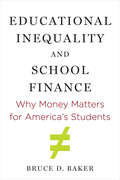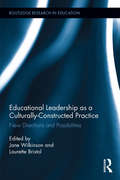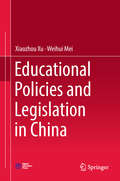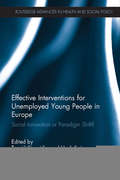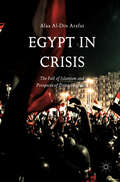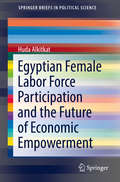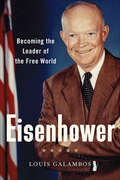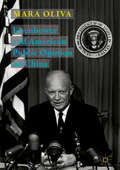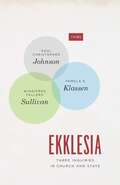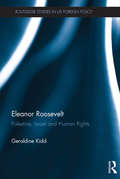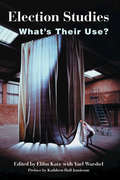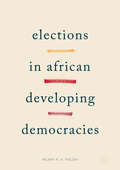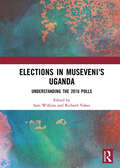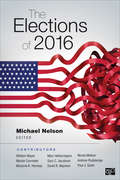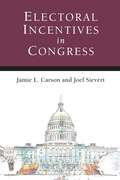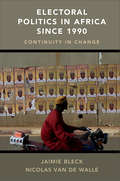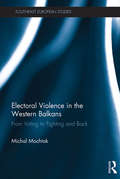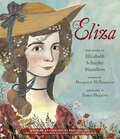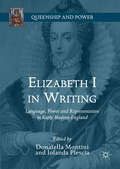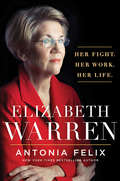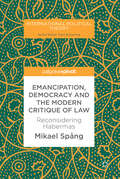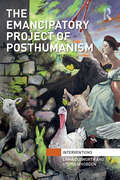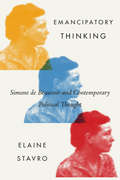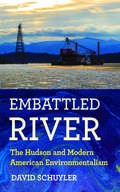- Table View
- List View
Educational Inequality and School Finance: Why Money Matters for America's Students
by Bruce D. BakerIn Educational Inequality and School Finance, Bruce D. Baker offers a comprehensive examination of how US public schools receive and spend money. Drawing on extensive longitudinal data and numerous studies of states and districts, he provides a vivid and dismaying portrait of the stagnation of state investment in public education and the continuing challenges of achieving equity and adequacy in school funding. Baker explores school finance, the school and classroom resources derived from school funding, and how and why those resources matter. He provides a critical examination of popular assumptions that undergird the policy discourse around school funding—notably, that money doesn&’t matter and that we are spending more and getting less—and shows how these misunderstandings contribute to our reluctance to increase investment in education at a time when the demands on our educational system are rising. Through an introduction to the concepts of adequacy, equity, productivity, and efficiency, Baker shows how these can be used to evaluate policy reforms. He argues that we know a great deal about the role and importance of money in schools, the mechanisms through which money matters for student outcomes, and the trade-offs involved, and he presents a framework for designing and financing an equitable and adequate public education system, with balanced and stable sources of revenue. Educational Inequality and School Finance takes an issue all too often relegated to technical experts and makes it accessible for broader public empowerment and engagement.
Educational Leadership as a Culturally-Constructed Practice: New Directions and Possibilities (Routledge Research in Education)
by Jane Wilkinson Laurette BristolThis edited book collection disrupts received notions of educational leadership, culture and diversity as currently portrayed in practice and theory. It draws on compelling studies of educational leadership from the global north and south, as well as from a range of ethnic, religious and gendered perspectives and critical research approaches. In so doing, the book powerfully challenges contemporary leadership discourses of diversity that reproduce essentialising leadership practices, binary divisions and asymmetrical power relations. The various chapters contest and move beyond exhortations for leadership in increasingly diverse societies; revealing through their rich portraits of the hybridity of leadership practice, the shallowness of diversity discourses that are framed as something "we" (the culturally homogenous) leader do to (heterogenous) ‘others’. The volume is more than critique. Instead it offers readers new directions and possibilities through which to understand, theorise and practise educational leadership in the twenty first century. In portraying leading as a "relational practice in contexts of cultural hybridity" (Blackmore, this volume), it extends critical theories for and of leadership practice, examining the intersectionality between leadership and a range of social categories, and challenging notions of leadership as a singular construct. Compelling research narratives reveal educational leadership practice as nuanced, temporal, site specific and prefigured by traditions and cultural understandings that reach beyond a simplification of educational leadership as understood through unitary lenses of race, gender or ethnicity. This book is essential reading for academics and students of educational leadership and management, as well as administrators.
Educational Policies and Legislation in China (Zhejiang University Press Ser. #2)
by Xiaozhou Xu Weihui MeiThis book provides a comprehensive overview of the development of educational policies and legislation in China, particularly following the introduction of Reform and Opening Up in 1978. The scope of this book: (1) provides the theoretical basis and framework of educational policies; (2) explains key educational laws and legislation; and (3) introduces readers to policies for educational internationalization, private education, lifelong learning and teacher education. The book is intended for researchers, teachers and graduate students in the field of comparative education, educational policy and legislation, educational management. Readers will find essential information on the most important educational laws and legislation, as well as the recent characteristics of and trends in educational policies in China.
Effective Interventions for Unemployed Young People in Europe: Social Innovation or Paradigm Shift?
by Tomás Sirovátka Henk SpiesYoung people in Europe have been disproportionally affected by unemployment as a result of the economic crisis and a large number of the most disadvantaged are migrant youth, or those of a different ethnic origin, living in deprived city neighbourhoods. This book examines the need for more appropriate interventions aimed at improving the inclusion of young people in the labour market, bringing together theoretical reflections and empirical evidence on emerging innovative policies and practices. Using case studies from across Europe, it asks how effectively innovative interventions respond to the specific needs, motivations, aspirations and strategies of unemployed and vulnerable youth within the contextual conditions of the welfare state and locality. It also provides a new theory of the effectiveness of interventions. As social exclusion remains high among young people in Europe, Effective Interventions for Unemployed Young People in Europe is essential reading for policymakers and practitioners. This book demonstrates where we can look for effective innovative interventions and how these can potentially add up to large-scale social innovation. It is also a crucial resource for academics and students interested in social and labour inclusion measures.
Egypt in Crisis
by Alaa Al-Din ArafatThis book deals with the sudden demise of Islamists in Egypt and prospects for democratization. It provides an overview of the different causes of the downfall of Morsi and the Islamists in Egypt. Additionally, it is posited that Morsi's coup-proofing strategy, which was modeled after Mubarak's, was responsible for the military turning against him. The author also argues that the Muslim Brotherhood's belief system played a major role in their downfall. The strained civil-military relations in Egypt are examined, as well as its likely future. This project will be of interest to diplomats; journalists; International Affairs specialists, strategists, or scholars of Egyptian politics and the Arab Spring; and anyone interested in social movements and democratization in the Middle East.
Egyptian Female Labor Force Participation and the Future of Economic Empowerment (SpringerBriefs in Political Science)
by Huda AlkitkatThis book sheds the light on the Egyptian females’ participation in labor force since 1960’s up to 2030. The main objective is to study trends of females’ participation in labor force and to predict the future participation. Egypt female participation in labor force has been increased slowly during the last fifty years since 1960’s, in spite of the encouragement polices that the government has adopted to empower women, particularly economic empowerment. Egypt's population size has rapidly increased during the past decades to about 90 million inhabitants in 2016. The working-age population (15-64) represents about 64% of the total population. Females represent about 49% of the working age population. However, they represent only about 24% of labor force in Egypt.Through its five chapters, this book will discuss the history of women's economic empowerment in Egypt, provide background on the trends of the most important female characteristics during the last decades, combines descriptive analysis with working life tables to break down the progression of the role of women in the Egyptian labor force, and presents a view of what could come in the time between now and 2030 in terms of the rights of women in this particular region.
Eisenhower: Becoming the Leader of the Free World (The\papers Of Dwight David Eisenhower Ser.)
by Louis Galambos"Highly accessible and sprightly written."—Library JournalWinner of the Kansas State Library's Kansas Notable Book AwardIn this engaging, fast-paced biography, Louis Galambos follows the career of Dwight D. "Ike" Eisenhower, offering new insight into this singular man who guided America toward consensus at home and a peaceful victory in the Cold War.The longtime editor of the Eisenhower papers, Galambos may know more about this president than anyone alive. In this compelling book, he explores the shifts in Eisenhower's identity and reputation over his lifetime and explains how he developed his distinctive leadership skills. As a career military officer, Eisenhower's progress was uneven. Galambos shows how Ike, with the help of Brigadier General Fox Conner, his mentor and patron, learned how to profit from his mistakes, pivot quickly, and grow as a military and civilian leader. On D-Day, Eisenhower guided the largest amphibious force in history to a successful invasion of France and a decisive victory. After the defeat of Nazi Germany, he turned to politics and was elected president in 1952.While today's fiercely partisan political climate makes it difficult to imagine a president forging consensus in Washington, that's exactly what Eisenhower did. As America's leader in an era of profound postwar changes at home and abroad, President Eisenhower sought a middle way with compromise and coalition building. He provided his country with firm-handed leadership, bringing prosperity and peace to the American people in the dangerous years of the Cold War—an accomplishment that made him one of the most influential men of the twentieth century. Destined to be the best short biography of the thirty-fourth president of the United States, Eisenhower conclusively demonstrates how and why this master of the middle way became the successful leader of the free world.
Eisenhower and American Public Opinion on China
by Mara OlivaIn the 1950s, most of the American public opposed diplomatic and trade relations with Communist China; traditional historiography blames this widespread hostility for the tensions between China and the United States during Dwight D. Eisenhower’s presidency. In this book, Mara Oliva reconsiders the influence of U.S. public opinion on Sino-American relations, arguing that it is understudied and often misinterpreted. She shows how the Eisenhower administration’s hard line policy towards Beijing had been formulated in line with U.S. national security interests, not as a result of public pressure. However, the public did play a significant role in shaping the implementation, timing and political communication of Washington’s strategy, ultimately hampering relations with the Communist giant and seriously heightening the risk of nuclear conflict. Drawing together an extensive array of published and unpublished sources, this book offers a new prism for understanding one of the most difficult decades in the history of both countries.
Ekklesia: Three Inquiries in Church and State (TRIOS)
by Paul Christopher Johnson Pamela E. Klassen Winnifred Fallers SullivanEkklesia: Three Inquiries in Church and State offers a New World rejoinder to the largely Europe-centered academic discourse on church and state. In contrast to what is often assumed, in the Americas the relationship between church and state has not been one of freedom or separation but one of unstable and adaptable collusion. Ekklesia sees in the settler states of North and South America alternative patterns of conjoined religious and political power, patterns resulting from the undertow of other gods, other peoples, and other claims to sovereignty. These local challenges have led to a continuously contested attempt to realize a church-minded state, a state-minded church, and the systems that develop in their concert. The shifting borders of their separation and the episodic conjoining of church and state took new forms in both theory and practice. The first of a closely linked trio of essays is by Paul Johnson, and offers a new interpretation of the Brazilian community gathered at Canudos and its massacre in 1896–97, carried out as a joint churchstate mission and spectacle. In the second essay, Pamela Klassen argues that the colonial churchstate relationship of Canada came into being through local and national practices that emerged as Indigenous nations responded to and resisted becoming “possessions” of colonial British America. Finally, Winnifred Sullivan’s essay begins with reflection on the increased effort within the United States to ban Bibles and scriptural references from death penalty courtrooms and jury rooms; she follows with a consideration of the political theological pressure thereby placed on the jury that decides between life and death. Through these three inquiries, Ekklesia takes up the familiar topos of “church and state” in order to render it strange.
Eleanor Roosevelt: Palestine, Israel and Human Rights (Routledge Studies in US Foreign Policy)
by Geraldine KiddMemorialised as a US heroine and an iconoclastic humanitarian who sought to protect society’s marginalised, Eleanor Roosevelt also, at times, disappointed contemporaries and biographers with some of her stances. Examining a period of her life that has not been extensively explored, this book challenges the previously held universality of Eleanor Roosevelt’s humanitarianism. The Palestinian question is used as a case study to explore the practical application of her commitment to social justice, and the author argues that, at times, Roosevelt’s humanitarianism was illogical, limited and flawed by pragmatism. New insights are provided into Eleanor Roosevelt’s human rights activism – its dichotomies, its inspiration, and the effect it had on US relations with the Middle East. This book will appeal to academics working across a range of disciplines including history, diplomatic history, American studies, Middle Eastern studies, US foreign policy, human rights and women’s studies.
Election Studies: What's Their Use?
by Elihu KatzAcademic studies of elections are not in the business of predicting outcomes. They are in the business of explaining them. The best studies treat voting data as raw material with which to explore socio-psychological processes such as individual decision-making and such sources of influence as issues, personality, media, socio-economic background, and party loyalty. The ebb and flow of ideologies and the comparative workings of different political systems are core topics on which election studies shed light. Looking back on more than fifty years of voting research, some of its major practitioners and critics reflect here on what has--and has not--been accomplished.
Elections in African Developing Democracies
by Hilary A. A. MiezahThe book explores the organization, conduct and supervision of elections in emerging democracies. It covers the broad spectrum of the democratic electoral process. This project is a synthesis of the author's practical knowledge and experience in the management of elections with the United Nations and other international organizations in Africa and Asia. The author addresses election practitioners, political parties, and all other stake holders, and provides a vision for building and blending indigenous traditions and systems of election into universally accepted norms and practices.
Elections in Museveni's Uganda
by Sam Wilkins and Richard VokesUganda’s 2016 elections, which returned thirty-year incumbent President Yoweri Museveni and his National Resistance Movement (NRM) in yet another landslide, took place in an atmosphere of patronage, coercion and fraud. But is this diagnosis sufficient to understand the processes of voting and regime maintenance in Uganda today? Based on a series of detailed case studies from across Uganda, this book provides a more nuanced and complex picture of what the Museveni regime is, and how it keeps winning elections. Whilst not denying that various electoral malpractices are systemic to the regime’s survival, the authors find that these cannot be extricated from Uganda’s history, its wider social realities, and its local political cultures in which the NRM has become so embedded. In so doing, the authors – who include anthropologists, development specialists, historians, geographers, and political-scientists – develop new ways of thinking about the meaning of voting and elections in non-democratic Uganda, and elsewhere. This edition was originally published as a special issue of the Journal of Eastern African Studies.
The Elections of 2016
by Michael C. NelsonBringing together a host of distinguished scholars, Michael Nelson's The Elections of 2016 reliably delivers a nuanced analysis of yet another momentous cycle of political contests. No other single volume can expose your students to the depth of analysis and expertise in this title. Whether discussing particular races or taking a broader look at the national trends, these contributors captivate students with engaging stories and political drama, while weaving in important scholarship and expert analysis. Available mere months after the election, each chapter, written specifically for this volume, offers readers historical perspective as well as a look forward at the implications for the American political system. New to this Edition Overview of Donald Trump’s campaign and what factors led to him winning the election. Analysis of the role that media and money played in the elections. Provides a look at Congressional elections, their outcomes, and impact.
The Elections of 2016
by Michael C. NelsonBringing together a host of distinguished scholars, Michael Nelson's The Elections of 2016 reliably delivers a nuanced analysis of yet another momentous cycle of political contests. No other single volume can expose your students to the depth of analysis and expertise in this title. Whether discussing particular races or taking a broader look at the national trends, these contributors captivate students with engaging stories and political drama, while weaving in important scholarship and expert analysis. Available mere months after the election, each chapter, written specifically for this volume, offers readers historical perspective as well as a look forward at the implications for the American political system. New to this Edition Overview of Donald Trump’s campaign and what factors led to him winning the election. Analysis of the role that media and money played in the elections. Provides a look at Congressional elections, their outcomes, and impact.
Electoral Incentives in Congress (Legislative Politics And Policy Making)
by Jamie L Carson Joel SievertDavid Mayhew’s 1974 thesis on the “electoral connection” and its impact on legislative behavior is the theoretical foundation for research on the modern U.S. Congress. Mayhew contends that once in office, legislators pursue the actions that put them in the best position for reelection. The electoral connection is a post-World War II phenomenon, but legislative scholars now suggest that Mayhew’s argument applies to earlier congressional eras. To assess these claims, Carson and Sievert investigate whether earlier legislators were motivated by the same factors that influence their behavior today, especially in pursuit of reelection. They examine how electoral incentives shape legislative behavior throughout the nineteenth century by looking at patterns of turnover in Congress; the re-nomination of candidates; the roles of parties in recruiting candidates, and by extension their broader effects on candidate competition; and, finally by examining legislators’ accountability. The results have wide-ranging implications for the evolution of Congress and the development of various legislative institutions over time.
Electoral Politics in Africa since 1990: Continuity in Change
by Jaimie Bleck Nicolas van de WalleDemocratic transitions in the early 1990s introduced a sea change in Sub-Saharan African politics. Between 1990 and 2015, several hundred competitive legislative and presidential elections were held in all but a handful of the region's countries. This book is the first comprehensive comparative analysis of the key issues, actors, and trends in these elections over the last quarter century. The book asks: what motivates African citizens to vote? What issues do candidates campaign on? How has the turn to regular elections promoted greater democracy? Has regular electoral competition made a difference for the welfare of citizens? The authors argue that regular elections have both caused significant changes in African politics and been influenced in turn by a rapidly changing continent - even if few of the political systems that now convene elections can be considered democratic, and even if many old features of African politics persist.
Electoral Violence in the Western Balkans: From Voting to Fighting and Back (Southeast European Studies)
by Michal MochtakSince the end of the Cold War there have been a number of cases where the democratization process has been turbulent, or even violent. Addressing electoral violence, its evolution and impact in the Western Balkans, this book explores the conflict logic of election and tries to understand its basic patterns. Two decades of electoral competition in the region are analysed to identify an interesting evolution of electoral violence in terms of forms, actors, motivations and dynamics. By identifying the potential drivers of electoral violence and explaining the escalation and stimulus of violence-related events, the author combines a theoretical approach with original data to emphasise the variability of the phenomenon and its evolution in the region. The book will appeal to students and scholars of post-communist Europe and democratisation processes and the Western Balkans in particular. It should also be of interest to political advisors and those involved in developing or implementing democratisation programmes.
Eliza: With an Afterword by Phillipa Soo, the Original Eliza from Hamilton: An American
by Margaret McNamaraFans of the musical Hamilton and their children won't want to miss this stunning picture book biography about Eliza Hamilton, American Founding Father Alexander Hamilton's extraordinary wife and an important figure in her own right. Includes an afterword from Phillipa Soo, the actress who originated the role of Eliza in Hamilton!We all know the story of scrappy Alexander Hamilton and his rise in American politics--but how much do we know about his workmate, inspiration, and stabilizing force, Elizabeth Schuyler Hamilton? Margaret McNamara employs the letter-writing style of the period to tell the story of Eliza Hamilton, who was born into a family of considerable wealth, power, and influence in Albany, New York, in 1757. Eliza was expected to marry into a similarly powerful family . . . until she met and fell in love with the charismatic Hamilton. She stood by him throughout his tumultuous life, and after his death, she single-handedly collected his papers and preserved them for historians and musical-theater writers of the future. Eliza outlived Hamilton by fifty years; during that time she founded the first orphanage in New York State, raised funds for the Washington Monument, and kept the flame of her husband's memory and achievements alive. This is a beautiful and informative biography featuring extensive back matter--including information about America's revolution, the historical relevance of letter writing, and a timeline--and exquisite, thoroughly researched art that mirrors paintings from 18th-century America. Every Hamilton lover will want to gift it to the young readers in their lives.
Elizabeth I in Writing: Language, Power And Representation In Early Modern England (Queenship and Power)
by Donatella Montini Iolanda PlesciaThis collection investigates Queen Elizabeth I as an accomplished writer in her own right as well as the subject of authors who celebrated her. With innovative essays from Brenda M. Hosington, Carole Levin, and other established and emerging experts, it reappraises Elizabeth’s translations, letters, poems and prayers through a diverse range of approaches to textuality, from linguistic and philological to literary and cultural-historical. The book also considers Elizabeth as “authored,” studying how she is reflected in the writing of her contemporaries and reconstructing a wider web of relations between the public and private use of language in early modern culture. Contributions from Carlo M. Bajetta, Guillaume Coatelen and Giovanni Iamartino bring the Queen’s presence in early modern Italian literary culture to the fore. Together, these essays illuminate the Queen in writing, from the multifaceted linguistic and rhetorical strategies that she employed, to the texts inspired by her power and charisma.
Elizabeth Warren: Her Fight. Her Work. Her Life.
by Antonia FelixA breakthrough Elizabeth Warren biography by best-selling author Antonia Felix.Elizabeth Warren's rise as one of America's most powerful women is a stirring lesson in persistence. From her fierce support of the middle class to her unapologetic response to political bullies, Warren is known as a passionate yet plain-speaking champion of equity and fairness. In the wake of one fellow senator's effort to silence her in 2016, three words became a rallying cry across the country:Nevertheless, she persisted...In this Elizabeth Warren book, best-selling author Antonia Felix carries readers from Warren's hardscrabble roots in Norman, Oklahoma, to her career as one of the nation's most distinguished legal scholars and experts on the economics of working Americans. Felix reveals how Senator Elizabeth Warren brought her expertise to Washington to become an icon of progressive politics in a deeply divided nation, and weaves together never-before-told stories from those who have journeyed with Warren from Oklahoma to the halls of power.Praise for Elizabeth Warren: Her Fight. Her Work. Her Life.:"Many politicians focus on the 'me'. Elizabeth Warren has always been about the 'we'—that sacred American bond of equal justice for all that Dr. King fought for. Felix's biography explains why we need her 'persistent' voice more than ever, now and in the future." — Congressman John Lewis"Felix is an excellent writer, and her book is, at its best, quite interesting." — NPR Books
Emancipation, Democracy and the Modern Critique of Law: Reconsidering Habermas (International Political Theory)
by Mikael SpångThis book focuses on Jürgen Habermas’ theorising on law, rights and democracy in light of the modern critique of law. The latter tradition, which goes back to Hegel and Marx, has addressed the limitations of rights as vocabulary of emancipation and law as language of autonomy. Since Habermas claims that his reconstruction of private and public autonomy has an emancipatory aim, the author has chosen to discuss it in the context of the modern critique of law. More specifically, the study addresses the need to consider the dialectic of law, in which law is both a condition for emancipation and domination, when discussing what law and rights permit. It will appeal to students and scholars across the fields of political theory, law and legal criticism, as well as sociology and sociology of law.
The Emancipatory Project of Posthumanism (Interventions)
by Erika Cudworth Stephen HobdenThis is the first book to make the argument for an emancipatory project from within a posthuman framework. Responding to critics, Cudworth and Hobden argue that while some posthumanisms may be less critical, it is possible to develop a political programme from a posthuman perspective. Cudworth and Hobden develop such issues by addressing the following questions: How have ideas about emancipation been developed, and does the notion of emancipation still hold relevance for the contemporary world order? Is it possible to have a non-Utopian form of emancipation? What are the implications of differing posthuman/new materialist viewpoints for an emancipatory project? In a world typified by complexity, how is it possible to pursue political projects? The chapters consider various interpretations of the term ‘emancipation’, looking at work that has appeared within the posthumanist framework such as Bruno Latour, William Connolly, and Jane Bennett. The authors develop their own account of posthumanism, demonstrating how it avoids the problems that have been found within this framework, and considering the possibilities for emancipatory projects and public policy. It will be of great interest to postgraduates and scholars of International Relations, Political Theory, Environmental Studies, and Sociology.
Emancipatory Thinking: Simone de Beauvoir and Contemporary Political Thought (McGill-Queen's Studies in the History of Ideas #76)
by Elaine StavroMost scholars have focused on The Second Sex and Simone de Beauvoir’s fiction, concentrating on gender issues but ignoring her broader emancipatory vision. Though Beauvoir’s political thinking is not as closely studied as her feminist works, it underpinned her activism and helped her navigate the dilemmas raised by revolutionary thought in the postwar period. In Emancipatory Thinking Elaine Stavro brings together Beauvoir’s philosophy and her political interventions to produce complex ideas on emancipation. Drawing from a range of work, including novels, essays, autobiographical writings, and philosophic texts, Stavro explains that for Beauvoir freedom is a movement that requires both personal and collective transformation. Freedom is not guaranteed by world historical systems, material structures, wilful action, or discursive practices, but requires engaged subjects who are able to take creative risks as well as synchronize with existing forces to work towards collective change. Beauvoir, Stavro asserts, resisted the trend of anti-humanism that has dominated French thinking since the 1960s and also managed to avoid the pitfalls of voluntarism and individualism. In fact, Stavro argues, Beauvoir appreciated the impact of material, socio-economic, institutional forces, without forgoing the capacity to initiate. Applying Beauvoir’s existential insights and understanding of embodied and situated subjectivity to recent debates within gender, literary, sociological, cultural, and political studies, Emancipatory Thinking provides a lens to explore the current political and theoretical landscape.
Embattled River: The Hudson and Modern American Environmentalism
by David SchuylerIn Embattled River, David Schuyler describes the efforts to reverse the pollution and bleak future of the Hudson River that became evident in the 1950s. Through his investigative narrative, Schuyler uncovers the critical role of this iconic American waterway in the emergence of modern environmentalism in the United States.Writing fifty-five years after Consolidated Edison announced plans to construct a pumped storage power plant at Storm King Mountain, Schuyler recounts how a loose coalition of activists took on corporate capitalism and defended the river. As Schuyler shows, the environmental victories on the Hudson had broad impact. In the state at the heart of the story, the immediate result was the creation in 1970 of the New York State Department of Environmental Conservation to monitor, investigate, and litigate cases of pollution. At the national level, the environmental ferment in the Hudson Valley that Schuyler so richly describes contributed directly to the creation of the Environmental Protection Agency in 1970, the passage of the Clean Water Act in 1972, and the creation of the Superfund in 1980 to fund the cleanup of toxic-dumping sites.With these legal and regulatory means, the contest between environmental advocates and corporate power has continued well into the twenty-first century. Indeed, as Embattled River shows, the past is prologue. The struggle to control the uses and maintain the ecological health of the Hudson River persists and the stories of the pioneering advocates told by Schuyler provide lessons, reminders, and inspiration for today's activists.
